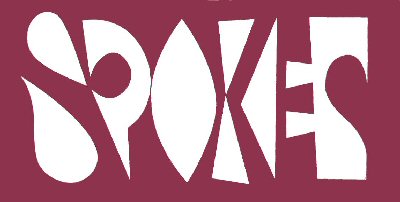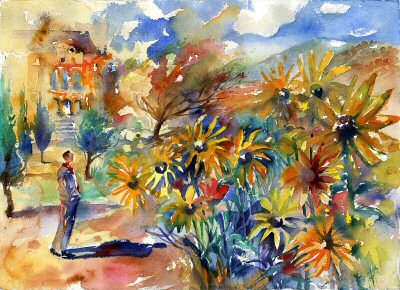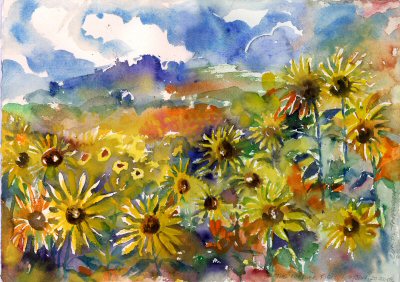


RefugeNick Burbridge
The time comes to face facts.
This is no dark alley, but a brick mews
set back carefully from the main street,
armed with circling lens and arcs of light.
The door shuts out a harsh night.I linger in the stained white lobby
as the duty worker – thick lenses,
Ramones t-shirt – checks me out,
and bounds upstairs. When he returns
my daughter shuffles in his wake;
he waits, as if we should be introduced,
and goes back to his booth when we embrace.Her room is glossed and battered
with the usual yellow bucket –
the last guest left in a body bag –
but a shelter with some heart,
spartan surfaces intently covered
with her bedspread, ornaments and posters,
the shelf lined with children’s books.We laugh and spar like strangers.
I pick out a familiar old cover –
Ming Lo Moves the Mountain –
and at once the space around us yields
to another, with cloud-patterned walls;she gazes at me from her pillow,
leaning on the fireplace,
telling her a peasant woman’s tale,
who, when rocks start
tumbling on their hut,
commands her husband to discover
how to shift the peak above.Only the long-sought for counsel
of a wise man wreathed in clouds of opium
persuades them that it might be safer
to remove their dwelling, piece by piece,
across the valley, to a kinder mountain.Now our laughter echoes from a deep place
as our eyes meet. This is no cul-de-sac.
Months of lies and threats have closed
my door on her, yet our despair
and anger disappear like sharp stones
falling from the sky. This is where
she is defined. I stand with her.Years may pass before we find some way clear.
We turn back to small-talk; I lose patience,
she averts her eyes and fidgets,
aching for her next hit. But we don’t cower.
In a moment we have moved
from there to here. We seek no blame.
We face facts. Neither of us is ashamed.
Dream Summer by Curtis TappendenVeterans
Nick Burbridge
Burdened by dark challenge and defeat
I summon doughty forebears, an unlikely union
that flourished in a cottage and a market garden
growing courgettes, cauliflowers, and strawberries
under cloches, in the hills near Bandon,
not so far from Béal-na-Bláth
where rivalries once took a heavy turn.The great aunt, native to the county,
was the last-born of an eccentric plumber
who converted when he wed a Belfast woman;
she abhorred her mother’s faith, reverted
to the Church of Ireland, and enlisted as a nurse
to serve the British Army, where she met
her one and only lover, in the Burmese jungle.As prisoner of war, the tortured soldier
had been laying rails by day and pinioned
in a dank black hole at night; and yet
the Japanese failed to break his heart;
when he was liberated, in her care,
he offered it to her; after the war,
though family on all sides swore
they would pay dearly, they made off
to the green vales of West Cork.From time to time they grieved and fought
but life took up a gentle rhythm;
they met trials and disappointments without fear
for they would always have known worse.
His passage into hell had left him white-haired,
sterile and stone-deaf, walking with a heavy limp;
across the years she steadily grew blind.So when they made their weekly trips
to market in their battered station-wagon
through the lanes round Bandon,
he became her sight, and she his ears;
together they manoeuvred their way there,
and steered home with the same craft.
In these parts they were a minor legend;
not to rival Michael Collins, a more cinematic hero
but regarded nonetheless with great respect.The invasion of the motor rally fazed them.
On Bank Holiday weekends
the ancient lanes turned into a maze,
insanely overtaken, where voyeur and fanatic,
lured by the roar of engines,
or the prospect of catastrophe,
thronged the banks around West Cork.Yet this, too, they resisted, with the cussed spirit
they had fostered, never to concede defeat.
One summer morning they set off,
loaded up with strawberries;
armed with their old strategies
they threaded a pedantic course among
demented vehicles, while stewards jumpedacross their path, roadside pundits cheered and gasped;
all those who savoured soon-to-unfold scenes of carnage
turned out to be wrong. By some ordinance,
divine or human, they came through their trial,
pulled into Bandon to offload their produce
at the market, and no peeler dared
to challenge them. It was a race well won.So it is, if I am driven to despair
by family foibles – say, unwanted pregnancy,
mental disorder, separation, heroin as torture,
or untimely death – far from the vales round Bandon,
I turn my inward eyes towards the past,
and the ingenuity of partners bound
by earnest vows they made to last.They died within a year of one another,
the cottage and the garden disappeared.
But I see the station-wagon still meander
round the high-hedged lanes,
laden with ripe fruit. I greet my kin
and travel with them through the green hills
of West Cork to their smallholding.There I grasp a neat glass of potcheen,
stand gazing through their web-edged windows,
as the sun sets on a spliced land;
and I forget all present knots that bind me,
in the name of root and sinew
that have made me what I am,
within, and I may yet become.
Sociopath
Nick Burbridge
The resting actor meets his stooge
in the new coffee shop
decked with abstract photographs –
two flapjacks, latte and soy cappuccino –
to run through the canine pageant
in the local park.Six months in the coastal village
and his face has made its mark;
some remain suspicious
(he played brutal killers
in so many television thrillers)
but, as he hoists his briefcase
packed with bills and posters,
tethers his Rottweiler
and takes a presidential pose,
his companion, briefly heedless
of his carpal tunnel syndrome,
strokes his Dachshund with a touch of awe,
sure the desultory windswept farce
he organised last year will not recur.Expertly assembled images of hounds
with keenly pointed snouts and upright tails
set against the croquet lawn
emblazoned with fluorescent font
pass smoothly through his hands;
he sees himself in lightweight suit
spinning risqué joke and anecdote
as he comperes proceedings with aplomb.And so he misses the main moment
when an inner storm, like petit mal,
fills the actor’s eyes with black.
If he was questioned by police
he could state he had no clue
the man had been so crudely struck;or he was locked
in his own daydream now,
turned to Andreas Baader
in a Berlin teahaus forty years ago;
his coloured flyers to be plastered
around trees and lamp-posts
with appeals for violent disorder;
his dry palm, under his jacket,
pressed against a Walther automatic;
they had met together,
not to plan the annual menagerie
but the brutal execution
of a super-rich tycoon
in the lock-up by the meeting-hall.As the villager at last looks up
he sees only the well-practised smile
his partner uses as a key
to any needed explanation:
too much method acting in his youth
has left him prey to moments
of strange disssociation,
inconvenient and stressful,
yet they bear a kind of truth;
for, though he is, at rest,
a safely grounded citizen,
they offer some expression
to the otherness he has to let
engulf him when he works.No need to fret.
Breed shows, races,
behavioural contests.
They shoot through
the carefully prepared programme,
pray the weather holds;
while in the actor’s inner space
all visions of heroic comrades
plotting mayhem
to arouse the proletariat,
and smash the capitalist system
vanish with a whiff
of honeysuckle from
the hanging bush outside.Only he knows,
since he’s found a new disguise,
how he will be called to act,
though, God forbid,
dog pageant should transform to massacre
or village green to feature set.
He turns away, muttering
a mantra learned by heart:
I’m good. I have identity.
Disintegration is a feature of the past.
We are safe in the lap
of the local bourgeoisie.
There will be no revolution
in the neighbourhood.
The Forever Field by Curtis Tappenden
Quietus
Nick Burbridge
1.
So it ends; in my mind’s eye
this dry bed where drawn figures
gather in the name of grief
turns into a distant gulch;
a sack of bones, I lie at the edge
of a waste with no frontiers,
pitched past dream, past field on field
etched with empty lines;
each quick moment seems to span aeons
though I am still anchored to this point.Nerve and sinew tauten with the wear of pain.
Where I was fluid once and yielded,
with each sanguine season
streams would swell and surge,
I have been pinched and drained
so long by a relentless sun
all memories of fertile years
the pulse and stretch of tenderness,
feel like myths to me, as this cracked skin
has turned to sore and crust.I will not rest like this; though I can’t trace
its source, I’m held here with a command:
if I’m to leave and not return
I must recover what I’ve lost.
Yet all I can recall are fragments
from a stranger’s past.
I peer into this wilderness, in search
of fallow earth that will bear
seed and root, grasping my last instincts
like a shard of glass, not to await
some final harrowing, or rise again
in a false miracle, but heeding what falls only
as a presence or intent, cast
over each broken fold:
for this is the nature of its work.Let me confess. I can’t make sense of timelessness,
and yet I’m sure I have already been marked out;
though to be gathered will mean all I fear most,
whether it brings peace or not. It will happen
when I least expect, betokening release.2.
Rattling in this bed, my sole sense
scaled thirst shuffling among shards
of cracked bone and torn flesh
I seem still fastened to parched rock.Another day breaks on the imagined land
I don’t know if I watch, or if I am;
rising through a film of greys, all that lay
concealed, over the last day’s span, unveils.I begged for this, but I can’t bear it.
Clear light steals across the folds
that breathe with quick forms,
drifting, and lost histories.Through lingering whorls of shadow
driven by these lucid shafts –
found as memory and vision –
the drear pall of drought and dustthat has to fall, to wither me
before I leave, concedes to the pure force
of what is made. I open
and spread ripely in its path,witness to my consummation:
all I might have sensed
or thought, given or withheld,
returns, as if it takes a present coursefully fraught and worked,
bordering wrought fields
stretched into the past, or yet to form,
fallen, earthbound, infinite.
As it appears, among dawn’s subtleties
it blanches and burns out. For all the faithful cast
of hands, the offer of moist buds,
my part here is done.All I have to yield is gathered; in the shadow
of loose fronds shielding where I lie,
I am no more than a leaf now,
bruised by the risen wind.A final dance begins. What will resolve
is effortlessly drawn to me. It cannot be denied.
It brooks no will of mine
but bears me from this wilderness.3.
Now last strands are broken
and unfolded. This is the season
to yield. Where dead reeds whisper,
through a willow’s shelter
clear night stretches, strewn with stars.You come drifting with the night.
No more than a pulse, or echo
of my pitch, I sense your shadow;
you move into me through the deep wound
I have become, where all I am lies open.My cracked spine’s arched. I strain for breath.
As you descend, or I incline,
while I’m still pinned by knots of time,
a rush of vapour rises. I taste salt and rheum.
I exit through a lock of nails and teeth.Traces of what’s pitched where we entwine
take form in a memory not mine:
pierced brow, torn palm, locked boughs
heavy with fruit, the rush of claws and wings.
This is how we must be worked:you leave the shroud of the infinite
to take shape in me. Sacrifice
or accident, it is complete.
You resolve, I am delivered.
What has moved us parts now and exults.4.
Insofar as we may be defined
since what we will become remains unread,
each of us takes form as a figure
in some parable: so we may recall
an ancient and corrosive woman
who so long followed a devout and fruitful course
she dreamt it would persist through her last years
but it brought her to a dry waste of despair.
Now she is lost, her essence opens
as a cask of keepsakes and images
vivified by any eye that falls on them,
carrying the past through time to come,
to bear witness to her in her absence:
accoutrements in a discovered tomb.She was not one who left unreconciled.
As she lay dying she took journeys
like dreams among the dead and the unmade;
she recovered what she had seen lost;
faced with dissolution, let her hands be clasped,
and in one breath all borders crossed.Insofar as we are not, and yet become,
at a point beyond the exit we must make,
where we still take imaginable form,
let her be found now
gathered as a full shape,
waiting out her term.This is no dream or vision
but where source and field elide
she may be seen; crouching
where a thin line falls
from a fissure in the rock to drink
and feed on blood-red berries,
gifts of bread left on a ledge for her.
Here, she grows swollen with intent
and silence, in a sphere
where seasons turn, not to advance,
or decay, but transfigure
in a dance of thanksgiving,
always fruitful,
always poised to fall.Now watch her make her way
into splayed rays of moonlight spreading
over fields of wheat and sunflowers
to a point where she can trace the contours
of this valley to dark mountains in the east,
as bruised clouds bind and bulge.Where she stands,
great drops hit the rock-face,
as the ripe earth stretches
and prepares beneath;
rain fallen courses
along rivulets and gulleys
endlessly descending;
when she kneels
to dissolve, torrents gather
as a clear pool that becomes her,
bursts its banks, and falls in a full stream,
leaping, tumbling, singing, circling –
if this parable must reach an end –
to the hard land below, where new work begins.

